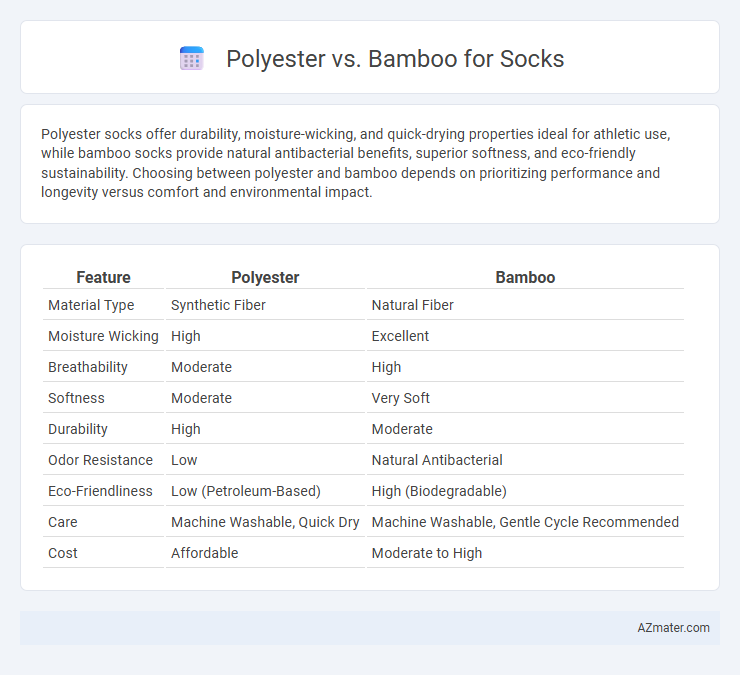Polyester socks offer durability, moisture-wicking, and quick-drying properties ideal for athletic use, while bamboo socks provide natural antibacterial benefits, superior softness, and eco-friendly sustainability. Choosing between polyester and bamboo depends on prioritizing performance and longevity versus comfort and environmental impact.
Table of Comparison
| Feature | Polyester | Bamboo |
|---|---|---|
| Material Type | Synthetic Fiber | Natural Fiber |
| Moisture Wicking | High | Excellent |
| Breathability | Moderate | High |
| Softness | Moderate | Very Soft |
| Durability | High | Moderate |
| Odor Resistance | Low | Natural Antibacterial |
| Eco-Friendliness | Low (Petroleum-Based) | High (Biodegradable) |
| Care | Machine Washable, Quick Dry | Machine Washable, Gentle Cycle Recommended |
| Cost | Affordable | Moderate to High |
Introduction to Polyester vs Bamboo Socks
Polyester socks offer durability, moisture-wicking properties, and cost-effectiveness, making them a popular choice for activewear and everyday use. Bamboo socks provide natural antibacterial qualities, breathability, and eco-friendly benefits due to their renewable source and biodegradability. Choosing between polyester and bamboo socks depends on priorities such as sustainability, comfort, and performance.
Material Composition and Sourcing
Polyester socks are primarily made from synthetic fibers derived from petroleum-based products, offering durability and moisture-wicking properties. Bamboo socks utilize natural bamboo pulp fibers, known for their eco-friendly cultivation, biodegradability, and inherent antibacterial qualities. Sourcing bamboo involves sustainable farming practices with rapid growth cycles, whereas polyester production depends on non-renewable resources and energy-intensive manufacturing processes.
Comfort and Softness Comparison
Bamboo socks offer superior softness and breathability due to natural moisture-wicking properties and a smooth fiber structure, enhancing overall comfort for sensitive skin. Polyester socks provide durability and elasticity but tend to retain heat and moisture, which may reduce comfort during extended wear. Choosing bamboo socks results in a cooler, softer feel, while polyester delivers resilience and moisture resistance ideal for active use.
Moisture-Wicking and Breathability
Polyester socks excel in moisture-wicking due to their synthetic fibers that rapidly draw sweat away from the skin, keeping feet dry during intense activities. Bamboo socks offer superior breathability, thanks to their natural micro-gaps and moisture-absorbing properties that enhance airflow and reduce odor. Combining polyester's quick-drying capabilities with bamboo's ventilation creates an optimal sock for moisture management and comfort.
Durability and Longevity
Polyester socks offer superior durability due to their resistance to abrasion, stretching, and shrinking, making them ideal for prolonged use. Bamboo socks, while naturally antimicrobial and breathable, tend to be less durable and wear out faster under heavy use. Choosing polyester enhances sock longevity, especially for activities demanding frequent washing and extended wear.
Eco-Friendliness and Sustainability
Bamboo socks offer superior eco-friendliness due to bamboo's rapid growth rate and minimal need for pesticides or fertilizers, making it a highly sustainable raw material. Polyester socks, typically made from petroleum-based synthetic fibers, have a larger carbon footprint and contribute to microplastic pollution during washing. Choosing bamboo socks supports renewable resources and biodegradable properties, whereas polyester socks emphasize durability but compromise environmental sustainability.
Skin Sensitivity and Allergy Factors
Polyester socks often trap moisture and heat, increasing the risk of skin irritation and allergic reactions for sensitive skin. Bamboo fibers are naturally hypoallergenic and moisture-wicking, reducing the likelihood of irritation and promoting better skin health. Choosing bamboo socks can benefit those prone to allergies and skin sensitivities by providing a softer, breathable option.
Odor Control and Hygiene
Polyester socks excel in moisture-wicking properties, helping reduce sweat accumulation and odor development, making them a popular choice for odor control. Bamboo fibers offer natural antibacterial and antifungal qualities that inhibit bacterial growth and maintain hygiene, enhancing freshness during prolonged wear. Combining bamboo's antimicrobial effects with polyester's moisture management creates an optimal sock material for odor control and hygiene.
Cost and Value for Money
Polyester socks offer a lower upfront cost and high durability, making them an economical choice for budget-conscious consumers seeking long-lasting wear. Bamboo socks, while generally priced higher, provide superior moisture-wicking, natural antibacterial properties, and enhanced softness, delivering greater comfort and eco-friendly value over time. Evaluating cost per wear highlights polyester's affordability against bamboo's premium performance and sustainability benefits, guiding optimal value-for-money decisions.
Final Verdict: Choosing the Right Sock Material
Polyester socks excel in durability, moisture-wicking, and affordability, making them ideal for athletic and everyday use. Bamboo socks offer superior softness, natural antibacterial properties, and eco-friendliness, appealing to those with sensitive skin and sustainability concerns. The final choice depends on balancing performance needs with comfort preferences and environmental impact.

Infographic: Polyester vs Bamboo for Sock
 azmater.com
azmater.com